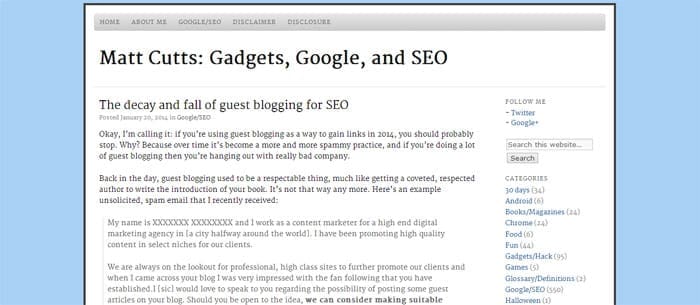The blogosphere, message boards, and forums have been up in airs this week after Matt Cutts (Head of Webspam, Google) posted on his personal blog that “guest blogging is done.” Before you read the rest of this post, take a look at the blog post in question: The decay and falling of guest blogging for SEO.
Analyzing Matt’s Guest Blogging Announcement
The gist of the overall post is that guest blogging has morphed into something akin to email spam, where sites are mass mailing webmasters with smarmy messages about contributing a guest post. I must say, this is not a surprise.
Here at Return On Now, we get at least two solicitations each business day.
Most of them are very similar to the sample that Cutts shares in his blog post.
In fact, most of them are similar…yet put together with far less thought and consideration.
I have even received messages in my Gmail account that claimed they had checked out my domain “www.gmail.com” and found that it isn’t ranking for my company’s primary keywords, so we should start posting SEO friendly content to my blog at “www.gmail.com.”
This is a clear example that guest blogging outreach has broken the cardinal rule of Google’s guidelines – it tries to automate a process that can only be done right if handled the old fashion way – manually.
Matt even goes so far as to say not to accept any guest posts from anyone that you would not personally vouch for.
While I agree with this point in principle, if we all stuck to that rule, guest blogging would indeed be done and over with!
Luckily, broad swaths such as that point tend to generalize far too much.
In a social networking driven business environment, content can come from close contacts or new friends. There’s nothing wrong with giving someone a chance to prove that they know their stuff.
Why Guest Blogging Remains Useful
Matt does specify that guest blogging is done (i.e. “stick a fork in it” done) as an SEO tactic.
If this is a precursor to a major penalty they have in the works, I really hope they think through it in detail before pushing out something that could hammer a large number of websites.
Guest blogging is a huge benefit for reasons other than SEO.
First, it builds up your business and personal brands, by exposing you to new readers and possible customers.
With some of my own guest blogging efforts, I have landed great clients who are very vocal when they are satisfied.
This leads to referral business and general goodwill.
Second, the right post in front of the right audience will result in quality referral traffic from the source domain to your own.
I have found that, on average, referral traffic from guest blogging is of higher quality and stickiness than nearly any other source aside from emailing my own list.
All of the key metrics support this notion, from time on site, to bounce rate, to number of pages per visit.
They visit, read, browse around, and often engage with me on social media or via our contact page.
Which leads us to the third key point, that guest blogging does wonders for expanding your network of business contacts.
If you are a good writer who knows your niche and has a great command of your focal area, you are sure to find like-minded professionals with whom your message resonates.
The tighter the niche, the easier it is to meet new friends and colleagues!
Finally, even if you aren’t guest blogging for backlinks, Google’s crawlers take citations into account.
So nofollow the links if the web owner is savvy enough to know what that means, but be sure your company / brand, your name, and your URL show up (even if not linked).
So no, guest blogging as a whole is not dead. There are still ample ways to derive value from it.
And Some Thoughts on Link Building Overall
On that note, there have been a slew of complaints about Google going after pretty much every proactive method of link building over the past few years.
Go back and read the comments on Matt’s blog post, and you’ll see what I mean.
They specifically call out PR links, directories, guest blogging, and a list of other tactics that once drove “link juice.”
If you really think about it, Google could very well choose to devalue any link you earn from any activity, just as soon as people start to figure out loopholes in the rules.
Even earned links often come with some sort of favor or bribe, only one that isn’t traceable via an algorithm or even a review of the site linking.
For some, this is how they do business.
There is no perfect answer, so at some point, we have to think that Google will pull back from the series of penalties.
Otherwise, what will remain of marketing?
It’s high time that Google steps up and makes something useful of Authorship.
Sure, it’s great to see my mugshot in the SERPs next to my content, but what does that really mean?
No one at Google has shared what the current status is or how it is impacting rankings, if it is at all.
If Google Authorship is really about reducing spam, then they have GOT to figure out a way to integrate it into their ranking algorithm ASAP. (2025 update: They gave up and shut down Google+ altogether)
Google+ was about identity verification, but it is pretty apparent that G+ has been slower to reach critical mass than they hoped.
Well, now is a great time to push that forward. How about authorship becomes mandatory for all guest bloggers if they want to show up in the SERPs for that content?
Perhaps we can also finally see what they can do with publisher markup, which is also out there but has not been clearly explained.
Together, these two markup tactics could clean up most of the garbage in quick turn, assuming they haven’t given up on them altogether yet.
So here’s my call out to Cutts and the Webspam Team – enough of the penalties.
Let’s get this authorship and publisher stuff figured out, and start using it to pre-qualify the real pros from the spammers and scammers.
They have a better answer sitting in front of them. Hopefully they accept that fact and move on it.
Summary
Matt Cutts’ blog post has caused quite an uproar in the SEO community.
It is eerily similar to other pre-announcements they made in advance of Panda and Penguin, so I’d wager that they have something in the works.
Let’s hope they are doing this in the more responsible, long-term focused way, rather than just rolling out another penalty with a slew of collateral damage in its wake.
The quality of the SERPs have incrementally improved, but with author and publisher markup, they have a great tool with the potential to clean up the tomfoolery in short order.
Your move Google. This should be interesting.
Updated October 27, 2025
Tommy Landry
Latest posts by Tommy Landry (see all)
- Where AI Introduces Risk Into Revenue Planning - February 19, 2026
- AI Is Already Influencing Your Forecasting. Do You Know Where? - February 18, 2026
- AI -Driven Discoverability Presentation at AIMA (January 2026, Full Video) - February 17, 2026





